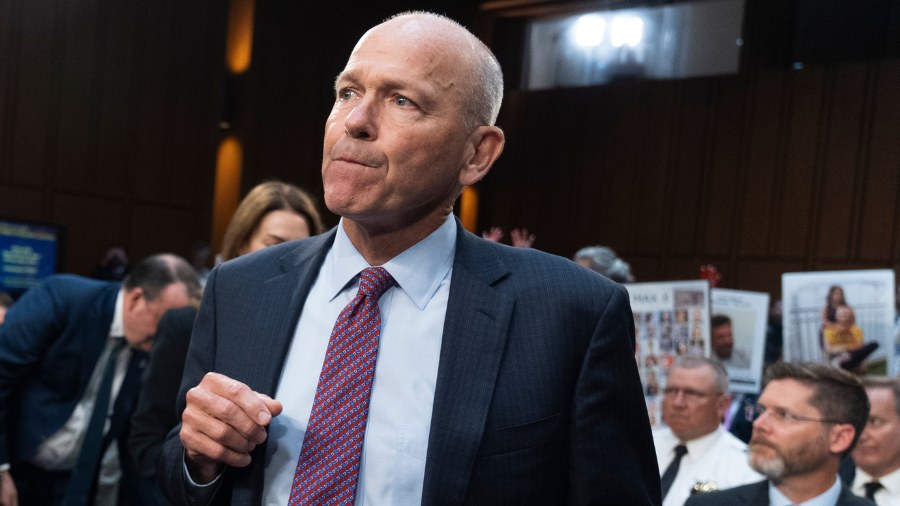Boeing CEO apologizes to relatives of 737 Max crash victims, defends firm’s safety record
Jun 18, 2024, 1:47 PM | Updated: 1:49 pm

With protesters in the audience, Boeing CEO Dave Calhoun takes his seat to testify before the Senate Homeland Security and Governmental Affairs Subcommittee on Investigations to answer to lawmakers about troubles at the aircraft manufacturer on Tuesday, June 18, 2024, in Washington, D.C. (Photo: Manuel Balce Ceneta, AP)
(Photo: Manuel Balce Ceneta, AP)
U.S. lawmakers grilled the Boeing chief executive (CEO) Tuesday about the company’s plans to fix its manufacturing problems and its willingness to heed whistleblowers’ warnings, while relatives of people who died in two crashes of the aircraft maker’s 737 Max jetliners were in the room to remind him of what was at stake.
CEO David Calhoun appeared before the Senate investigations subcommittee, which is chaired by Sen. Richard Blumenthal, D-Conn., a Boeing critic. Blumenthal opened the hearing by recognizing the relatives of the crash victims and the family of a Boeing whistleblower who died earlier this year.
“This hearing is a moment of reckoning,” the senator said. “It’s about a company, a once iconic company, that somehow lost its way.”
Calhoun’s appearance was the first before Congress by a high-ranking Boeing official since a panel blew out of a 737 Max during an Alaska Airlines flight in January. No one was seriously injured in the incident, but it raised fresh concerns about the company’s best-selling commercial aircraft.
Speaking out: Families of those who died in Boeing crashes press DOJ for prosecution
Calhoun sat at the witness table and fidgeted with his eyeglasses as Blumenthal spoke. Sen. Ron Johnson, R-Wisc., thanked the CEO for coming to face “tough questions.” Before giving his prepared opening statement, Calhoun stood and faced the people in the audience holding poster-sized photos of some of the 346 people who died in the 2018 and 2019 crashes.
“I apologize for the grief that we have caused,” he said.
Senators asked Calhoun if Boeing retaliated against employees who reported concerns and if he had ever spoken directly with any whistleblowers. He replied that he hadn’t but said he would.
The toughest line of inquiry came from Sen. Josh Hawley, R-Mo., who repeatedly asked Calhoun about the size of his salary. Calhoun, who has said he plans to retire at the end of the year, earned $32.8 million in compensation last year.
“You are cutting corners, you are eliminating safety procedures, you are sticking it to your employees, you are cutting back jobs because you are trying to squeeze every piece of profit you can out of this company,” Hawley said, his voice rising. “You are strip-mining Boeing.”
Asked by Hawley why he had not resigned, Calhoun answered: “Senator I’m sticking this through. I’m proud of having taken the job. I’m proud of our safety record. And I am very proud of our Boeing people.”
Hawley interrupted. “You’re proud of the safety record?” he asked with incredulity.
Calhoun responded, “I am proud of every action we’ve taken.”
Hawley shot back, “Frankly sir, I think it’s a travesty that you’re still in your job.”
Hours before Calhoun arrived on Capitol Hill, the Senate panel released a 204-page report with new allegations from a whistleblower who said he worries that “nonconforming” parts — ones that could be defective or aren’t properly documented — are going into 737 Max jets.
Sam Mohawk, a quality assurance investigator at the 737 assembly plant near Seattle, claims Boeing hid evidence of the situation after the Federal Aviation Administration informed the company a year ago that it would inspect the plant.
“Once Boeing received such a notice, it ordered the majority of the (nonconfirming) parts that were being stored outside to be moved to another location,” Mohawk said, according to the report. “Approximately 80% of the parts were moved to avoid the watchful eyes of the FAA inspectors.”
Previous coverage: Boeing tells federal regulators how it plans to fix aircraft safety and quality problems
The parts were later moved back or lost, Mohawk said. They included rudders, wing flaps and tail fins — all crucial in controlling a plane.
The FAA said it would “thoroughly investigate” claims raised in the Senate report. A Boeing spokesperson said the company got the subcommittee report late Monday night and was reviewing the claims.
The 737 Max has a troubled history. After the Max jets crashed in 2018 in Indonesia and 2019 in Ethiopia, the FAA subsequently grounded the aircraft for more than a year and a half. The Justice Department currently is considering whether to prosecute Boeing for violating terms of a settlement it reached with the company over allegations it misled regulators who approved the plane.
Mohawk told the Senate subcommittee that the number of unacceptable parts has exploded since production of the Max resumed following the crashes. He said the increase led supervisors to tell him and other workers to “cancel” records that indicated the parts were not suitable to be installed on planes.
The FAA briefly grounded some Max planes again after January’s mid-air blowout of a plug covering an emergency exit on the Alaska Airlines plane. The agency and the National Transportation Safety Board opened separate investigations of Boeing that are continuing.
The company says it has gotten the message. Boeing says it has slowed production, encouraged employees to report safety concerns, stopped assembly lines for a day to let workers talk about safety, and appointed a retired Navy admiral to lead a quality review. Late last month, it delivered an improvement plan ordered by the FAA.
During his Senate appearance, Calhoun defended the company’s safety culture.
“Our culture is far from perfect, but we are taking action and making progress,” Calhoun said in his prepared remarks Tuesday. “We are taking comprehensive action today to strengthen safety and quality.”
The drumbeat of bad news for Boeing goes on, however.
In the past week, the FAA said it was investigating how falsely documented titanium parts got into Boeing’s supply chain, and federal officials examined “substantial” damage to a Southwest Airlines 737 Max after an unusual mid-flight control issue.
Boeing disclosed that it hasn’t received a single order for a new Max — previously its best-selling plane — in two months.
Blumenthal first asked Calhoun to appear before the Senate subcommittee after a whistleblower, a Boeing quality engineer, claimed that manufacturing mistakes were raising safety risks on two of the biggest Boeing planes, the 787 Dreamliner and the 777. He said the company needed to explain why the public should be confident about Boeing’s work.
Boeing pushed back against the whistleblower’s claims, saying that extensive testing and inspections showed none of the problems that the engineer had predicted.
The Justice Department determined last month that Boeing violated a 2021 settlement that shielded the company from prosecution for fraud for allegedly misleading regulators who approved the 737 Max. A top department official said Boeing failed to make changes to detect and prevent future violations of anti-fraud laws.
Prosecutors have until July 7 to decide what to do next. Blumenthal said at the start of Tuesday’s hearing that he thinks the Justice Department should prosecute the company.
Families of people who died in the Boeing Max crash in Ethiopia have pushed the Justice Department repeatedly to prosecute Boeing.
“We will not rest until we see justice.,” said Zipporah Kuria, whose father died in the crash. She said the U.S. government should “hold Boeing and its corporate executives criminally responsible for the deaths of 346 people.”






